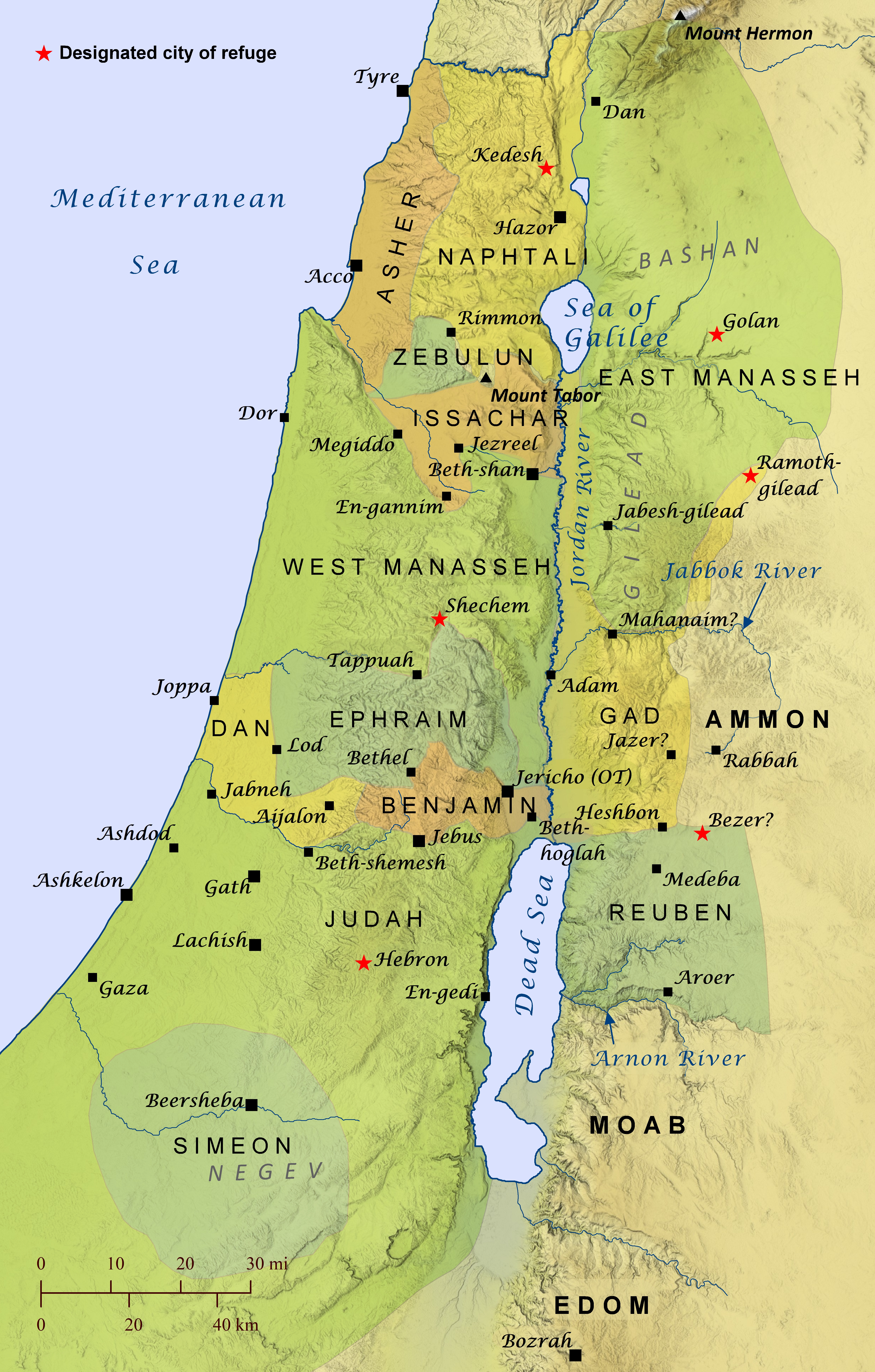Readers’ Version
Literal Version
17 The allotment for Menashsheh’s descendants (Yosef’s eldest son) included a special allotment for (Gilead’s father) Makir—he was given Gilead and Bashan because he was a powerful warrior. 2 The other Menashsheh clans that were allocated land were the Abiezer, Helek, Asriel, Shekem, Hefer, and Shemida clans. (They were the sons of Yosef’s son Menashsheh who led their own clans.) 3 But Zelofehad (son of Hefer, son of Gilead, son of Makir, son of Menashsheh) had no sons—only daughters who were named Mahlah, Noah, Hoglah, Milkah, and Tirzah. 4 They approached the priest Eleazar and Yehoshua and the other leaders and said, “Yahweh told Mosheh to give us an inheritance along with our brothers.” So he[fn] gave them an inheritance (like he’d given their uncles), as Yahweh had instructed them.[ref] 5 So ten blocks were allocated to Menashsheh tribe as well as Gilead and Bashan which were across the Yordan 6 because Menashsheh’s daughters received inheritances along with his sons. The land of Gilead belonged to the rest of Menashsheh’s sons.
7 The border for Menashsheh went from Asher to Mikmetat opposite Shekem, then went south towards the spring at Tappuah. 8 (The Tappuah land was for Menashsheh, but Tappuah town was for Efrayim.) 9 Then the border went south to the Kanah riverbed—the cities there belonged to Efrayim even though they were inside Menashsheh’s land—then the border stayed on the north side of the riverbed and extended to the Mediterranean. 10 So the south was for Efrayim and the north was for Menashsheh, and the sea was the western border, meeting Asher from the north and Yissakar from the east. 11 Menashsheh was allocated cities inside both Yissakar’s and Asher’s territories: Beyt-Shan, Ibleam, Dor, Endor, Taanach, and Megiddo along with their surrounding towns.[fn] 12 But Menashsheh’s descendants weren’t able to take possession of those cities, so the Canaanites continued to live in the region.[ref] 13 When the Israelis strengthened their position, they were able to force those Canaanites to work for them, but they weren’t able to drive them out.
14 Then the two half-tribes of Efrayim and Menashsheh asked Yehoshua, “Why have you only given to us one measured allocation as an inheritance when we’re very numerous because Yahweh has already blessed us?”
15 “If there’s so many of you,” Yehoshua answered, “and if Efrayim’s hill-country is too small for you, go into the forested area of the Perizzites and the Refaites and clear some land for yourselves there.”
16 “The hill country certainly isn’t big enough for all of us,” they responded, “plus the Canaanites living in the Yezreel valley and in Beyt-Shan and the surrounding towns have iron chariots.”
17 So Yehoshua told the half-tribes of Efrayim and Menashsheh, “Yes, there’s a lot of you and you’re very powerful. One land allotment wouldn’t be enough for you 18 so the hill country will be yours as well. However, it’s a forest and you’ll have to clear it to the borders. You’ll need to drive out the Canaanites even if they are strong and with iron chariots.”
17:4 It’s not clear who this ‘he’ refers to here—some translations choose Eleazar (implied by the sentence structure) and others choose Yehoshua (implied by past allocations of land).
17:11 We’ve omitted the final Hebrew phrase here (the three of Nafet) since it’s unclear what it means (plus it’s not considered to be a vital point in the narrative).
2 And_he/it_was for_descendants_of Mənashsheh the_rest to_their_clans for_sons_of ʼAⱱīˊezr and_for_sons_of Helek and_for_sons_of ʼAsrīʼēl and_for_sons_of Shəkem and_for_sons_of Ḩēfer and_for_sons_of Shəmīdāˊ these were_the_descendants_of Mənashsheh the_son_of Yōşēf the_male to_their_clans.
3 And_to_Tsəlāfəḩād/(Zelophehad) the_son_of Ḩēfer the_son_of Gilˊād the_son_of Mākīr the_son_of Mənashsheh not they_belonged to_him/it sons if/because (if) daughters and_these are_the_names_of daughters_of_his Maḩlāh and_Noˊāh Hoglah Milcah and_Tirʦāh.
4 And_came to_(the)_face_of/in_front_of/before ʼElˊāzār the_priest/officer and_before Yəhōshūˊa/(Joshua) the_son_of Nūn and_before the_leaders to_say YHWH he_commanded DOM Mosheh to_give to/for_us an_inheritance in_the_middle brothers_of_our and_he/it_gave to/for_them to the_mouth_of YHWH an_inheritance in_the_middle the_brothers_of father_of_their.
5 And_ the_allotted_portions_of _fell of_Mənashsheh ten to/for_besides of_land_of the_Gilˊād and_the_Bāshān which on_other_side of_the_Yardēn/(Jordan).
6 If/because the_daughters_of Mənashsheh they_inherited an_inheritance in_the_middle sons_of_his and_land_of the_Gilˊād it_belonged to_descendants_of Mənashsheh the_rest.
7 And_ the_border_of _he/it_was of_Mənashsheh from_ʼĀshēr the_Mikmətāt which is_on the_face_of Shəkem and_went the_boundary to the_south to of the_inhabitants_of ˊĒyn.
8 To_Mənashsheh it_belonged the_land_of Tapūaḩ and_Tapūaḩ to the_border_of Mənashsheh belonged_to_descendants_of ʼEfrayim.
9 And_went_down the_border the_wadi_of Kanah south_to of_the_brook cities the_these to_ʼEfrayim in_the_middle the_cities_of Mənashsheh and_border_of Mənashsheh on_north_side_of the_brook ends_of_it and_he/it_was the_sea_at.
10 South_to belonged_to_ʼEfrayim and_north_to to_Mənashsheh and_he/it_was the_sea border_of_its and_in/on/at/with_ʼĀshēr reached on_north and_in/on/at/with_Yissāskār/(Issachar) on_east.
11 And_he/it_was for_Mənashsheh in/on/at/with_Yissāskār and_in/on/at/with_ʼĀshēr Bēyt Shan and_her/its_daughters and_Yiⱱləˊām/(Ibleam) and_her/its_daughters and_DOM the_inhabitants_of Dōr and_her/its_daughters and_inhabitants_of Endor and_villages_of_its and_inhabitants_of Taˊₐnāk and_villages_of_its and_inhabitants_of Məgiddōn and_her/its_daughters the_three_of the_naphath.
12 And_not the_descendants_of they_were_able of_Mənashsheh to_take_possession_of DOM the_towns the_these and_determined the_Kənaˊₐnī to_live on_the_earth the_that.
13 And_he/it_was if/because the_people_of they_became_strong of_Yisrāʼēl/(Israel) and_put DOM the_Kənaˊₐnī to_forced_labour and_to_drvie_out not he_drove_out_them.
14 and_ the_descendants_of _they_spoke of_Yōşēf/(Joseph) with Yəhōshūˊa/(Joshua) to_say why have_you_given to/for_me an_inheritance a_lot one and_portion one and_we am_a_people numerous to that until thus blessed_us YHWH.
15 And_he/it_said to_them Yəhōshūˊa if are_a_people numerous you go_up to/for_yourself(m) the_forest_to and_clear to/for_yourself(m) there in_land the_Pərizzī and_the_Rəfāʼīm if/because it_is_narrow to/for_yourself(m) the_hill_country_of ʼEfrayim.
16 And_ the_descendants_of _they_said of_Yōşēf not it_will_be_found to/for_us the_hill_country and_chariots_of iron in_all the_Kənaˊₐnī the_live in_land_of the_valley have_those in_house_of shəʼān and_her/its_daughters and_to_those in/on/at/with_valley_of Yizrəˊʼēl/(Jezreel).
17 And_ Yəhōshūˊa _he/it_said to the_house_of Yōşēf to_ʼEfrayim and_to_Mənashsheh to_ are_a_people _say numerous you and_power great to/for_you(fs) not it_will_belong to/for_yourself(m) a_lot one.
18 If/because the_hill_country it_will_belong for_you if/because is_forest it and_clear_it and_it_was to/for_yourself(m) farthest_borders_of_its if/because you_will_dispossess DOM the_Kənaˊₐnī if/because chariotry_of iron to_him/it if/because is_strong he.

